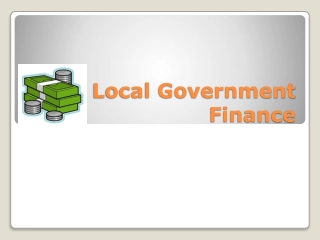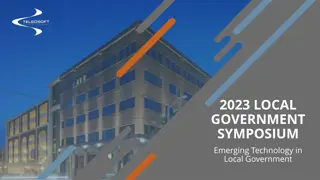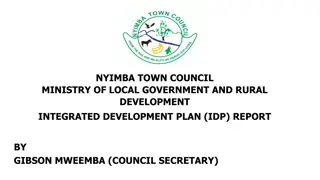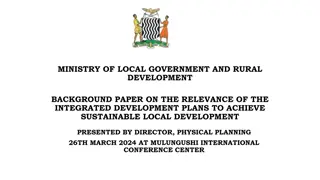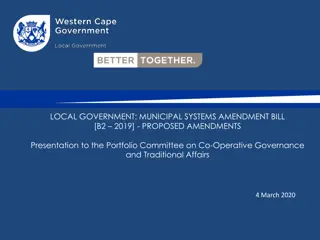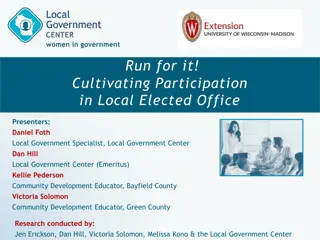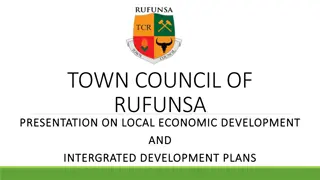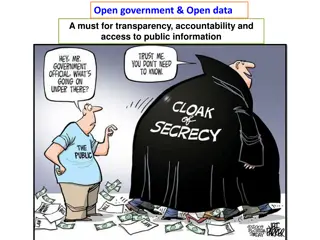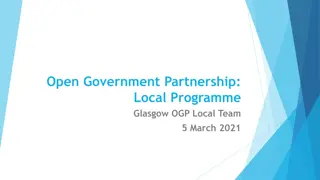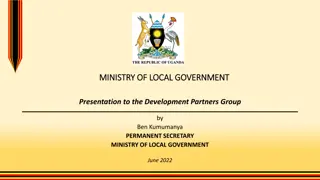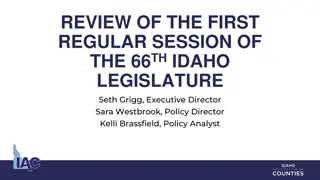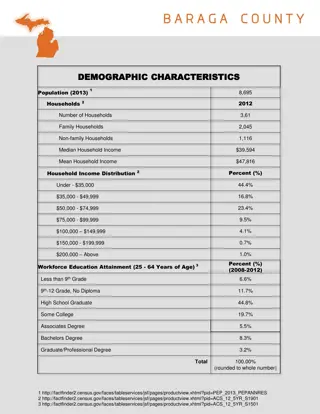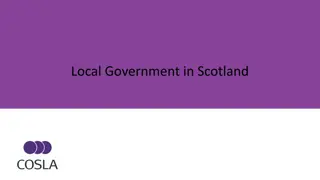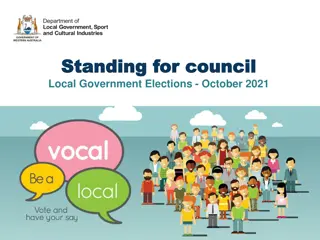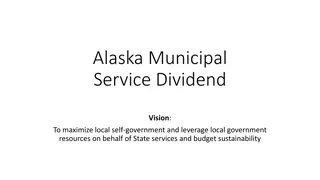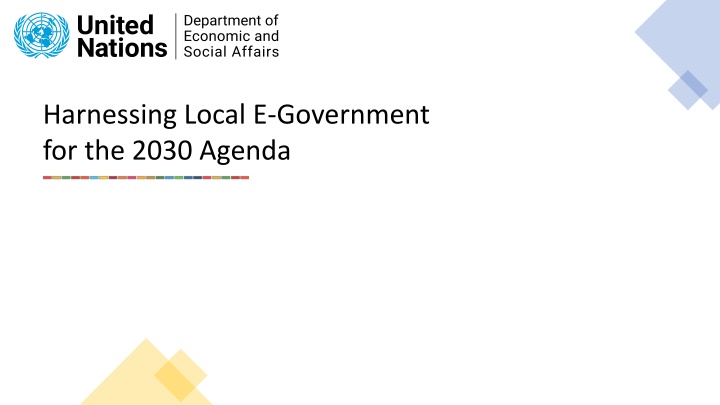
Challenges in Local E-Government Development
Challenges in local e-government development include national and local discrepancies in online service levels, urban and rural digital divides, lack of skilled personnel, and resources disparities. Addressing these challenges is essential for advancing sustainable development.
Download Presentation

Please find below an Image/Link to download the presentation.
The content on the website is provided AS IS for your information and personal use only. It may not be sold, licensed, or shared on other websites without obtaining consent from the author. If you encounter any issues during the download, it is possible that the publisher has removed the file from their server.
You are allowed to download the files provided on this website for personal or commercial use, subject to the condition that they are used lawfully. All files are the property of their respective owners.
The content on the website is provided AS IS for your information and personal use only. It may not be sold, licensed, or shared on other websites without obtaining consent from the author.
E N D
Presentation Transcript
Harnessing Local E-Government for the 2030 Agenda
Background Local Online Service Index 2018 40 cities 60 indicators 2020 100 cities 80 indicators 2022 193 cities 86 indicators
Challenges in Local E-Government Development National and Local Discrepancy 1 41% of cities fall short in comparison to their countries' Online Service levels, highlighting a gap in public service delivery due to limited resources, impeding local governments' ability to invest in digital infrastructure Urban and Rural Divide ITU data reveals a stark digital divide: 81% of urban residents had internet access in 2023 versus 50% in rural areas, dropping to 17% in low-income countries' rural regions. Digital divides persist not only between urban and rural areas but also within cities and regions, encompassing disparities in internet access, usage, and digital literacy due to uneven distribution of educational and technological resources. 2 Lack of Skilled Personnel 3 The shortage of skilled personnel to manage digital systems challenges local governments, potentially causing service disruptions and inadequate support for residents' digital needs. Resources disparity 4 The LOSI evaluation of 2022 reveals an unequal distribution within the highest LOSI tier. While 20 cities in Europe, 10 in Asia, 6 in the Americas, and 2 in Oceania meet this criterion, the striking absence of major cities in African nations is a cause for concern, highlighting a significant disparity across various regions.
Seizing Opportunities: Advancing Local E-Government for Sustainable Development Opportunity Implementing Strategy Best Practice SDG and Target SDG 11 (Sustainable Cities and Communities), Target 11.3. India's Smart Cities Mission. A dedicated national fund and capacity-building program supporting local governments in developing digital infrastructure and enhancing governance and services Establish a dedicated fund at the national level to support local and regional governments in developing and maintaining digital infrastructure Recognizing local governments' diverse challenges is crucial to unlocking technology's potential for sustainable development. Understanding their needs enables effective policy-making to localize SDGs through digital tools, requiring a unified, whole-of- government approach with comprehensive guidance. This section presents seven targeted opportunities to address local e- government challenges in achieving SDGs. Promoting National and Local Alignment The Philippines' Free Wi-Fi for All Program is a notable example of efforts to bridge the Internet access gap. Through partnerships with telecom companies, the initiative expands broadband coverage in rural areas, subsidizes data plans, and promotes digital literacy Launch targeted initiatives for rural connectivity, including: i) partnerships with telecommunication companies to expand broadband coverage, and ii) subsidized data plans for rural residents. SDG 9 (Industry, Innovation, and Infrastructure), Target 9. C Bridging the Internet Access Divide The Danish Government Digital Academy equips civil servants with essential digital skills. It offers tailored courses, such as 'Government Officials within the Digital Public Sector' and 'Cyber and Information Security,' focusing on areas like strategy, data management, and collaboration, guided by the Model of Digital Skills. Institute specialized training programs for local personnel, focusing on e- governance policies, digital platforms, and data management SDG 8 (Decent Work and Economic Growth), Target 8.6 Enhancing Digital Workforce
Seizing Opportunities: Advancing Local E-Government for Sustainable Development Opportunity Implementation Strategy Best Practice SDG and Target Promoting Equitable Resource Distribution Conduct a thorough assessment of resource distribution among cities, identifying gaps and allocating resources based on need. Implement policies to incentivize private sector investment in less privileged cities, fostering a balanced distribution The Making Cities Resilient 2030 (MCR2030) initiative, led by the United Nations Office for Disaster Risk Reduction empowers cities to assess resilience, identify resource gaps, and implement policies for equitable distribution SDG 11 (Sustainable Cities and Communities), Target 11.A Integrated Data Empowerment Establish and enforce standardized protocols for seamless data sharing and interoperability across government levels. Create a centralized platform for efficient data exchange, fostering collaboration between diverse government entities and promoting evidence-based decision-making. Singapore exemplifies Integrated Data Empowerment by enforcing standardized protocols for seamless data sharing. Their centralized platform promotes collaboration and evidence-based decision- making. SDG 16: Peace, Justice, and Strong Institutions, Target 16.6 People-Driven Service Transformation Implement co-design and inclusive decision-making practices for local online services aligned with the SDGs. Launch a dynamic online hub for accessible guidelines, encouraging active resident participation in service development and evaluation. Reykjavik, Iceland, "Better Reykjavik" initiative, enables residents to propose and prioritize ideas, actively involving them in decision-making. SDG 16: Peace, Justice, and Strong Institutions, Target 16.7 The LOSI Network - A Global Platform to Champion Local E-Government Leverage UN DESA tools, such as the LOSI Network, and comprehensive guidance on the Application of LOSI Methodology to empower stakeholders, inform policy, gather insights, and drive action for advancing local e-government and sustainable development, promoting the LOSI methodology globally Several UN Member States, including Jordan, Brazil, India, Uzbekistan, and the State of Palestine, have implemented the LOSI methodology across their municipalities, using findings to inform policy decisions and improve local e- government practices.
LOSI Network https://publicadministration.un.org/egovkb/
Policy Recommendations Provide training and support to local government officials on how to effectively manage and maintain digital systems developing online training modules, offering in-person workshops, and establishing peer-to-peer learning networks among local governments Strengthen collaboration and resource allocation between national and local governments To ensure equitable access to digital infrastructure and capacity building establishing national funds specifically for local e-government initiatives, providing technical assistance to local governments, and developing standardized e-government platforms that can be easily adapted by local authorities. 3 1 Encourage regional cooperation and knowledge sharing among local governments in different parts of the world The LOSI Network offers access to a global community of e-government stakeholders and serves as a catalyst for collaboration, facilitating active peer-to-peer learning exchanges and the development of impactful joint training programs. 4 Invest in expanding internet access and digital literacy programs in rural areas partnering with private sector companies to provide affordable internet access, establishing community technology centers, and developing targeted digital literacy training programs for rural residents 2 Mainstreaming Local E-Government in National Development Strategies integrating local e-government objectives and targets into national development plans and policy frameworks and establishing mechanisms for multi- level governance coordination and collaboration to synchronize efforts between national, regional, and local authorities. 5

